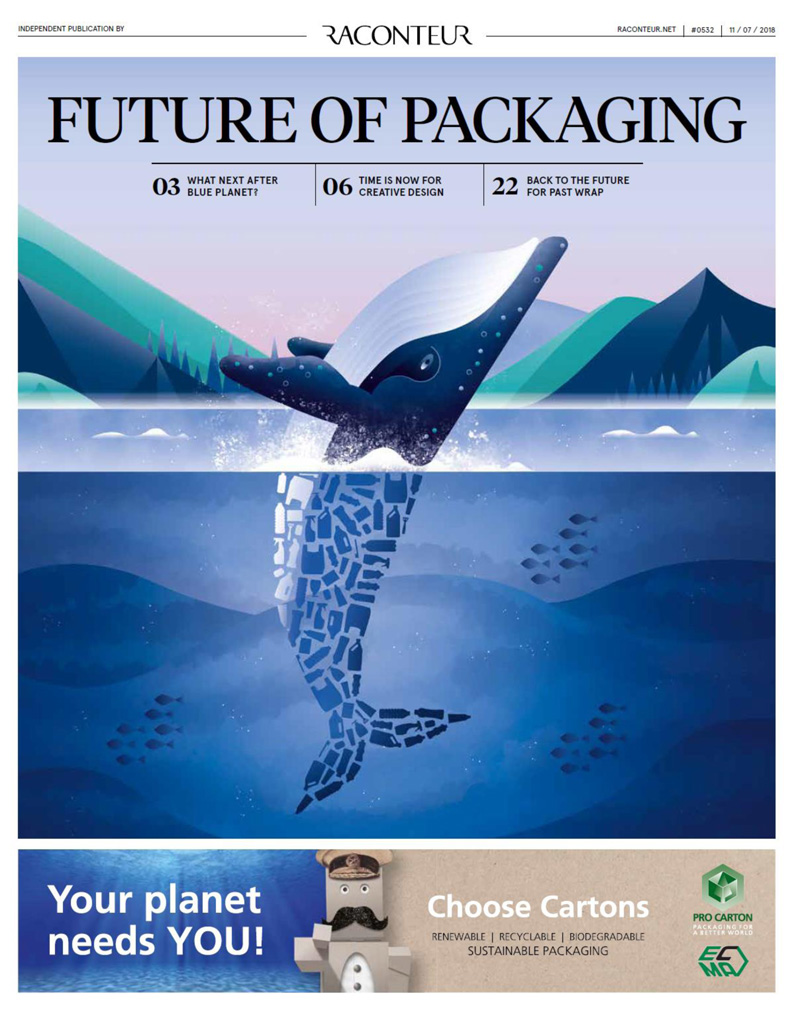July 2018

Times Future of Packaging 18 July – carton makers answer call for sustainability
Demand is high for environmentally friendly packaging. Carton producers are stepping up to the challenge of delivering the materials and containers required.
Individuals and businesses increasingly demand that the packaging enclosing their products is not eco logically damaging, as awareness rises around the effect of packaging on the environment. Meanwhile, governments are pushing the packaging industry to reduce its environmental impact dramatically.
Against this backdrop, cartonboard is gaining ever-greater favour because it is inherently well placed as a sustainable alternative to plastic and other materials. The market for carton packaging continues to expand, growing by around 2.5 per cent per annum in recent years, a figure expected to accelerate as negative media coverage intensifies on the use of environmentally harmful packaging.
"Cartons are the most sustainable of packaging materials," says Tony Hitchin, General Manager at Pro Carton, a European industry body representing the mills that make cartonboard material. "They are renewable, they come from trees in sustainably managed forests and from recycled material, and around 83% of paper and cardboard packaging is sent for recycling." Cartonboard is also biodegradable. Mr. Hitchin describes this as a ‘perfect example of the circular economy', as recycled cartons can be made into new cartons.
Aside from the benefits of carton packaging itself, big strides are also being taken in manufacturing processes. "Whole cartonboard mills have been set up to run on an ecological and sustainable basis. More than 90% of European mills have combined heat and power plants that provide their own energy," says Mr. Hitchin
96% of brand owners and retailers believe sustainable packaging is important.
78% rank cartonboard as ‘most sustainable form of packaging.'
97% say that recyclability is the most important factor in sustainability.
Over the last two decades the scale of carbon emissions at these mills has reduced by around 40%. In addition, the industry is the largest producer and user of biomass energy, and more new trees are planted than are used, ensuring the expansion of European forests.
Pro Carton is looking to expand the three Rs of recycling – reduce, reuse and recycle – into the five Rs of responsibility, adding renew and replace. This means choosing packaging materials that are truly renewable and encouraging brand owners and retailers, in particular, to act responsibly and choose sustainable materials to replace ones that are not as environmentally friendly. "There are plenty of opportunities where cartons and cartonboard could replace other materials; companies just need to look and challenge the status quo," says Mr. Hitchin. Carton makers have a strong background in packaged foods and pharmaceuticals, and the fast food industry is becoming a particularly important growth area. More companies are keen to package their fast foods in cartonboard, as Hans van Schaik, Managing Director of the European Carton Makers Association (ECMA), explains, "A lot of fast food packaging is now cartonboard, with new biodegradable lining barriers increasing their range of potential applications."
This is a clear case of usefully replacing less sustainable material. "Packaging materials are chosen based on their particular protective characteristics, functionality, aesthetics and cost, but unfortunately some cause long-term harm to the environment," adds Mr. Hitchin. "We should only use them when there's not a viable sustain able option."
Cartonboard also offers a huge range of potential shapes and structures, finishes and effects, textures and varnishes. The industry continually researches how to improve its designs. "All manufacturers are looking at how to use less packaging in their designs, and less of the material itself, while retaining its impact and strength," says Mr. van Schaik. "They do this in collaboration with their clients, always thinking about how best to protect, preserve and present the product."
Research efforts need to continue to shift the packaging industry towards the position of having much-improved environmental and sustainability credentials. An important part of that process will be conversations between producers and consumers, with new applications for cartonboard constantly being explored.
Awareness of packaging waste and its potential environmental impact continues to grow at the consumer level, as well as among retailers, brand owners, manufacturers, industry bodies, NGOs and governments. What the future holds for the packaging process and products at large remains to be seen, but cartonboard looks set to play an ever more central role in the packaging industry's improvement and governments' drive towards cutting environmental impact.
Demand among retailers and brand owners for sustainable packaging materials is now very strong. Pro Carton's own research in 2017 found 96% viewed packaging sustainability as an important issue for their businesses, with a focus on the use of recyclable, renewable and minimal lightweight materials that are biodegradable or compostable, and having a low environmental footprint.
"Each company's view of sustainability may be different, but having a lower impact on the environment overall is clearly very high on their agenda," notes Mr. Hitchin. "There needs to be co-operation between brand owners, retailers, carton manufacturers and carton mills to provide a continually more sustainable solution."
Major decisions on packaging sustainability are already being taken by large goods buyers such as supermarket chain Iceland. Earlier this year, the company vowed to eliminate the use of plastic packaging on all its own-brand products in the space of only five years. As Mr van Schaik says, the importance of getting packaging right should not be underestimated. "Packaging is preventing food waste and protecting products. It's part of daily life, in the supermarket, in your kitchen and your bathroom cabinet. It's everywhere, and has a big, positive impact on the economy and on life in general," he says.
Mr Hitchin concludes: "The industry has tremendous credentials. European forests are increasing in size by the equivalent of 1,500 football pitches every day, cartons are recycled in huge quantities, they are compostable and biodegradable, and don't leave scars on the environment. Our message is quite succinct: your planet needs you to choose sustainable packaging, choose cartons."
Source: The Times










